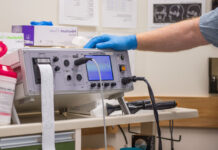Electroconvulsive therapy (ECT) is still given to approximately 2,500 people in England annually. A course of ECT consists of 6-12 sessions in which an electric current is applied to the brain, causing a seizure. NICE Guidelines in 2003 noted that there was very limited evidence for the effectiveness or safety of this procedure, and made an urgent call for more research. More recently, 26 MPs, including the shadow minister for Mental Health, Dr. Rosena Allin-Khan, have called for an independent enquiry into the practice and regulation of ECT.
Guest blog: Call for an independent review into the practice of ECT
The recently published draft NICE Guidelines for Depression in Adults revisited ECT along with their other recommendations. However, none of the serious concerns NICE raised about ECT in 2003, or since, have been addressed. Consultation on the draft closed on January 12.
An open letter from 50 people, including 18 ECT patients and relatives, 12 psychiatrists, and 7 professors, has been sent to NICE, and the government, calling for the ECT section of the draft guidelines to be ‘radically rewritten’ to avoid putting patients’ safety at risk.
https://univeastlond.prod.acquia-sites.com/sites/default/files/17431.pdf
The letter lists the ten most important flaws in the draft guidance:
- Abandoning the call for robust research into effectiveness and safety made by NICE in 2003 and reiterated in 2009 and 2014
- Abandoning NICE 2003’s call to establish safe dosages and consistent practice
- No statement about the need for regular testing for adverse cognitive/memory effects
- No recommendations on the provision of rehabilitation and compensation for memory loss/brain damage
- No comment on the huge regional variation in usage (up to 47-fold between different Trusts)
- Failure to address NICE 2003’s concern that many people are unaware of their rights and may be subject to coercion to have ECT
- Failure to address NICE 2003’s concern that the research ‘did not adequately capture the experience of service users’ who often felt that effects such as memory loss outweighed the benefits
- Failure to reiterate important limitations on the recommended uses of ECT cited in NICE 2003
- No statement about the failure to produce evidence-based patient information leaflets, as recommended by NICE 2003
- Failure to address the need for proper regulation of ECT, rather than optional, in house monitoring by the Royal College of Psychiatrists
The letter concludes:
‘Failure to address these concerns would represent a wilful neglect of patient safety, and a breach of NICE’s own commitment to evidence-based practice. …We trust the committee will, even at this late stage, and in line with its own principles and procedures, reconsider’.
One of the signatories is Dr. Sue Cunliffe who is no longer able to work because of the brain damage caused by ECT. She commented, in a media release about the letter:
‘NICE’s failure to produce strong, evidence-based guidelines in the past contributed to my ending up brain-damaged. Their new draft guidelines are a breach of their own principles and would be a massive step backwards, giving psychiatrists the green light to practise even more unsafely than was the case when they damaged my brain’
Another signatory is Dr. Chris Harrop, who co-authored two recent independent audits of ECT practice in England which identified multiple flaws, including in monitoring for memory loss and in ECT information leaflets. He wrote:
‘Passing responsibility for setting standards to the Royal College of Psychiatrists’ ECT Accreditation Service, as suggested in the draft, would be like asking a drug company to set safety standards for its own drugs. The conflict of interest is blatantly clear.’
‘Despite our making sure that the committee was aware of recent research into how badly ECT is currently being administered, they have produced a negligent draft which abandons the principles of evidence-based medicine. Dropping the call they have been making for 20 years for robust research into efficacy and safety would be a chilling development.’
Consultant Clinical Psychologist, Dr. Lucy Johnstone, added;
‘Something has gone seriously wrong at NICE to produce such a blatantly inadequate document that would inevitably put patients’ safety at risk. Professionals and patients have been campaigning about this for years. We hope they have sufficient integrity to reconsider’.
Sophie Corlett, Director of External Relations at Mind said:
‘While there has been some good progress in NICE’s draft guidance on depression in relation to access to different therapies, we urgently need to see that progress built on further by NICE re-appraising the effectiveness and safeguards around the use of ECT. We know that some people have found it effective for improving symptoms of mental health problems – particularly depression – when nothing else has worked while others have experienced serious adverse side effects. This re-appraisal must involve people with lived experience of depression and ECT and must be timely so as not to further delay the introduction of the new treatment guidance. We also need to see NICE make recommendations relating to better data collation and reporting for those who have experienced adverse side effects as a result of ECT.’
English solicitors Freeths LLP are currently preparing claims on behalf of patients who have suffered long-term memory loss as a result of ECT administered without their informed consent.
Meanwhile, in the USA, a manufacturer of ECT machines has filed for bankruptcy because so many lawsuits have been filed against it that it can no longer get insurance.



